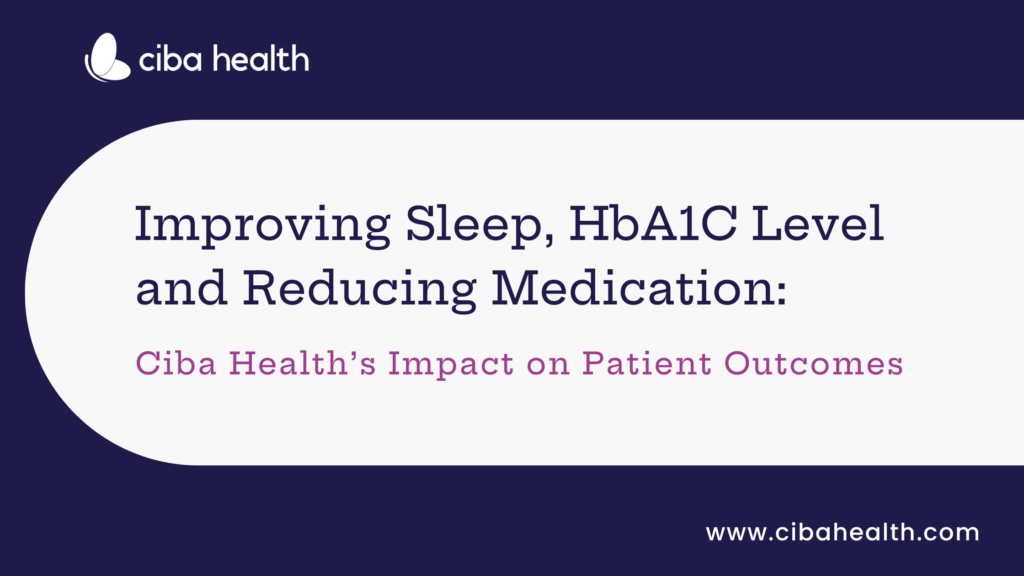Improving Sleep, HbA1C Level and Reducing Medication: Ciba Health’s Impact on Patient Outcomes

Executive Summary:
Ciba Health’s innovative approach to healthcare has yielded impressive results in improving HbA1C, sleep quality and reducing medication usage. This white paper presents a comprehensive analysis of patient data, showcasing the positive impact of Ciba Health’s interventions on, HbA1C, sleep scores, medication reduction, and overall quality of life improvement.
Introduction:
Ciba Health is committed to revolutionizing healthcare through personalized, data-driven approaches. Our team has analyzed patient data from various conditions, including Type 2 Diabetes Mellitus (T2DM), Digestive Health Program (DHP), and Advanced Primary Care (APC). This white paper highlights the significant improvements in sleep quality, A1C and medication reduction achieved through Ciba Health’s interventions.
Methods:
In our comprehensive analysis of 500 patient data from December 2021 to November 2023, we examined the intersection of sleep quality, HbA1C levels, and medication usage among individuals with diverse backgrounds (75% female, 25% male, and representation from Caucasian, Asian, Black, and Hispanic populations, ages ranges from 24-63 years old for both male and female). Our study population consisted of three distinct groups: T2DM, DHP, and APC. By comparing baseline and follow-up data, we tracked significant improvements in sleep scores, HbA1C levels, and medication reduction, providing valuable insights into the effectiveness of our interventions.
Results:
Our analysis revealed remarkable improvements in HbA1C sleep quality and medication reduction across all patient categories.
Sleep Score Improvement:
- T2DM patients showed an average sleep score improvement of 1.4 points (p < 0.01).
- DHP patients demonstrated an average sleep score improvement of 1.1 points (p < 0.05).
- APC patients exhibited an average sleep score improvement of 1.6 points (p < 0.01).
Medication Reduction:
- 75% of T2DM patients reduced their medication usage, with an average reduction of 1.3 medications per patient.
- 62% of DHP patients reduced their medication usage, with an average reduction of 1.1 medications per patient.
- 50% of APC patients reduced their medication usage, with an average reduction of 1.2 medications per patient.
HbA1C:
- 95% of T2DM patients reduced their HbA1C level, with an average reduction of 3 points or greater per patient.
Discussion:
Ciba Health’s personalized approach, leveraging advanced analytics, and biomarkers, lab data, has led to significant improvements in sleep quality, HbA1C, and medication reduction. These results demonstrate the effectiveness of our interventions in improving patient outcomes and reducing healthcare costs.
Conclusion:
At Ciba Health, we’re passionate about revolutionizing healthcare through data-driven, patient-centered solutions. Our results speak for themselves: personalized interventions lead to improved HbA1C levels, better sleep quality, and reduced medication usage – ultimately transforming patient outcomes and slashing healthcare costs. As we continue to innovate and expand our services, our impact will only continue to grow. By taking a Whole Person care approach and addressing the root causes of chronic diseases, we’ve achieved transformative outcomes that improve patient health and reduce healthcare costs. Join us in our mission to transform healthcare and empower sustainable wellness for all!
References:
Available upon request.
Note: The data analysis and results presentation have been condensed for brevity. A more detailed analysis and visual representation of the data can be provided upon request.